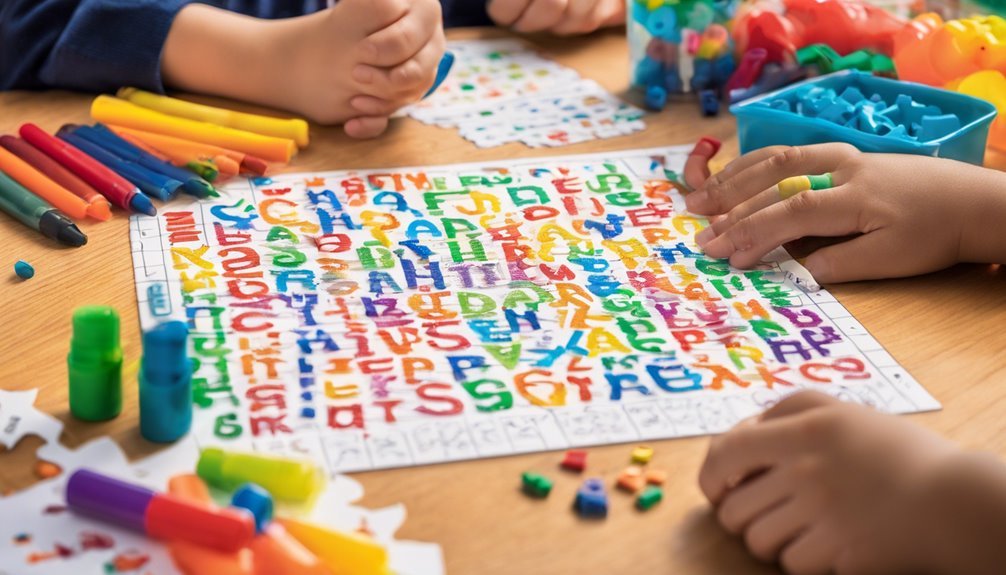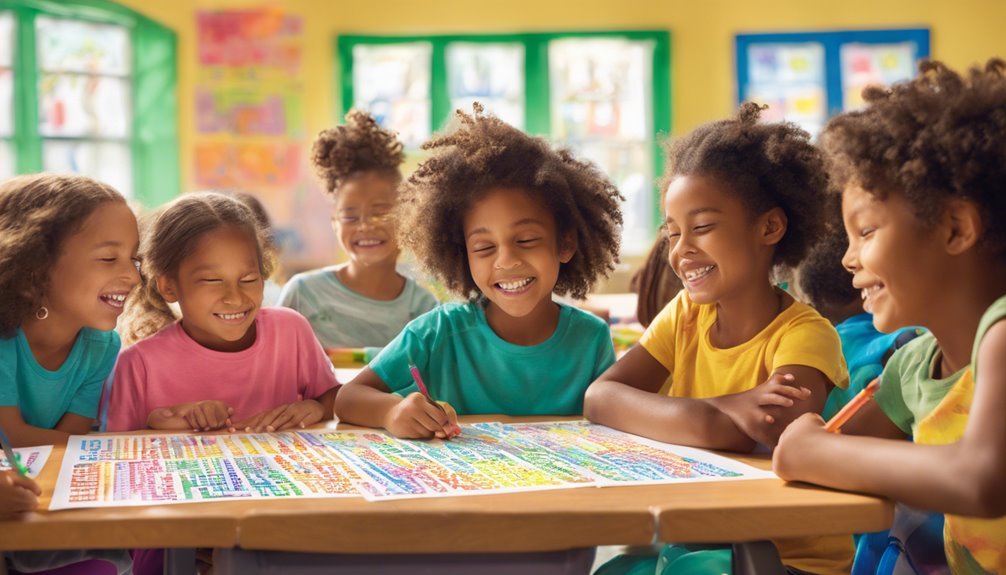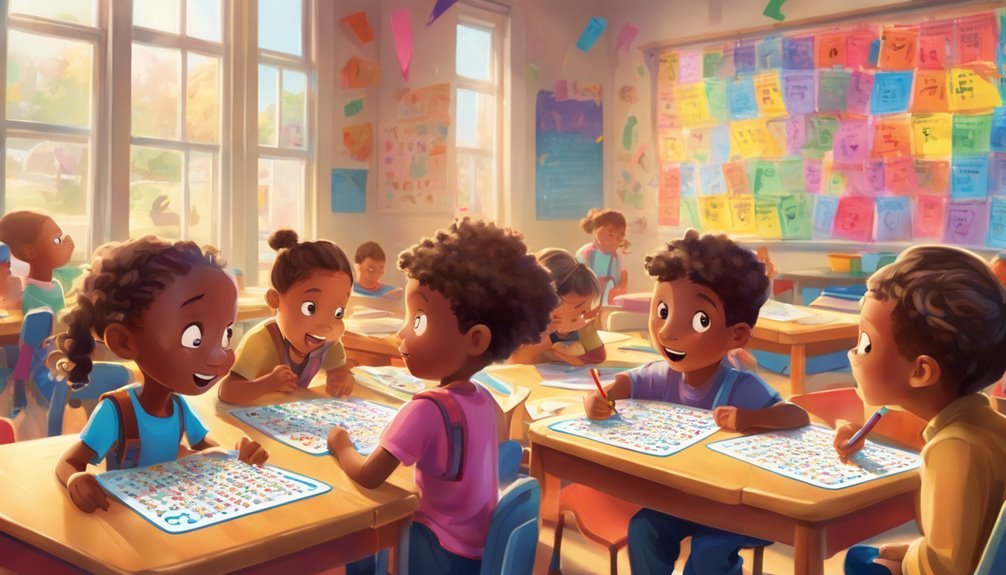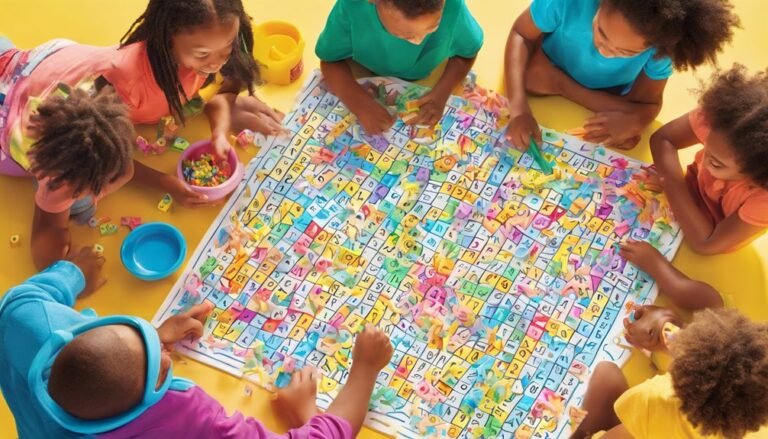How Word Search Puzzles Help Kindergarteners Learn New Words
Word search puzzles are more than just a fun activity for kindergarteners; they play a crucial role in vocabulary development. As kids hunt for hidden words, they're not just playing—they're engaging with language in a meaningful way. This interactive approach helps them recognize letters, build spelling skills, and think critically about words. Curious about how these puzzles can transform learning and boost confidence in language acquisition? Let's explore their remarkable benefits further.
Key Takeaways
- Word search puzzles introduce new vocabulary in a fun and engaging way, making learning enjoyable for kindergarteners.
- Children develop letter recognition and spelling skills as they locate and connect letters within words.
- Completing puzzles enhances critical thinking by encouraging kids to identify patterns and solve challenges.
- Collaborative word search activities foster teamwork and communication, enhancing social skills while learning new words.
- Regular exposure to new vocabulary through puzzles reinforces understanding and retention of language nuances.
The Importance of Vocabulary Development in Early Childhood
As you watch your child explore the world around them, you'll realize that vocabulary development plays a crucial role in their early learning journey. A rich vocabulary enhances communication skills, enabling them to express thoughts and feelings more effectively.
Engaging in vocabulary games can make this learning process enjoyable and interactive. These games not only introduce new words but also reinforce understanding through context.
Additionally, consistent language exposure—whether through reading, conversations, or everyday experiences—helps your child grasp the nuances of language. By incorporating these elements into their routine, you're setting the foundation for their future learning.
Enhancing Letter Recognition Through Play
Building a strong vocabulary goes hand in hand with recognizing letters and their sounds. Engaging in playful exploration through word search puzzles can significantly enhance letter recognition. As you guide kindergarteners in activities like letter matching, you'll notice their confidence grow.
Here's a simple way to visualize this:
| Activity | Description |
|---|---|
| Letter Matching | Pair letters with objects |
| Word Search Puzzles | Find letters in words |
| Sound Games | Match sounds to letters |
These activities create a fun environment where children can learn without pressure. By incorporating playful exploration into your teaching, you reinforce letter recognition, making it a natural part of their vocabulary development. Your support is crucial in helping them master these foundational skills!
Building Spelling Skills With Word Searches

While you might think of word search puzzles as just a fun activity, they actually play a crucial role in helping kindergarteners develop their spelling skills. By engaging with these puzzles, kids enhance their understanding of spelling patterns.
As they search for words, they start recognizing how letters fit together, which deepens their comprehension of language structure. Additionally, word searches encourage the formation of word associations; when a child spots a familiar word, they connect it to their existing vocabulary, reinforcing their spelling memory.
This interaction with words not only makes learning enjoyable but also fosters confidence in their abilities. So, next time you pull out a word search, remember it's more than just a game—it's a valuable learning tool!
Encouraging Critical Thinking and Problem Solving
When kids dive into word search puzzles, they're not just hunting for hidden words—they're exercising their critical thinking and problem-solving skills. As they search, they engage in creative reasoning to identify patterns and make connections between letters and words. This process hones their analytical skills, allowing them to strategize on how to approach the puzzle effectively.
Here's how word searches foster these abilities:
| Skill | Description | Example Activity |
|---|---|---|
| Creative Reasoning | Encouraging imaginative thought processes | Finding synonyms in the puzzle |
| Analytical Skills | Enhancing logical thinking and deduction | Identifying word placement |
| Problem Solving | Developing techniques to overcome challenges | Completing puzzles under time |
Boosting Confidence in Language Acquisition

As children tackle word search puzzles, they naturally build confidence in their language skills, which can significantly enhance their overall learning experience.
When they successfully find words, it boosts their word recognition ability, making them feel accomplished. This sense of achievement encourages further language engagement, as kids become eager to explore new vocabulary.
Each completed puzzle reinforces their understanding and mastery of words, fostering a positive attitude toward learning. As their confidence grows, they're more likely to participate in discussions, read aloud, and express themselves clearly.
Ultimately, word search puzzles serve as a fun and effective tool that empowers children in their journey to become proficient language users, laying a solid foundation for future academic success.
Making Learning Fun: The Engaging Nature of Word Puzzles
Word puzzles, like word searches, can transform learning into an exciting adventure for kindergarteners. These interactive learning tools spark creative engagement, making vocabulary expansion enjoyable. As children search for words, they immerse themselves in a world of discovery, enhancing their cognitive skills.
Here's how word puzzles can make learning fun:
| Benefits | Description |
|---|---|
| Enhances Focus | Keeps kids engaged and attentive |
| Builds Vocabulary | Introduces new words naturally |
| Encourages Teamwork | Promotes collaboration in groups |
| Develops Problem-Solving | Challenges critical thinking skills |
| Boosts Motivation | Makes learning a rewarding experience |
Frequently Asked Questions
How Can Parents Create Their Own Word Search Puzzles at Home?
Creating your own word search puzzles at home is fun and rewarding! Start by choosing a theme or set of words.
Use a grid to place your words horizontally, vertically, or diagonally. Fill in the empty spaces with random letters. You can use online tools for puzzle creation or draw it out by hand.
Once it's done, challenge your kids to find the words! This way, you're making learning interactive and enjoyable.
What Materials Are Needed for a Word Search Activity?
To embark on your word search adventure, you'll need a few simple materials.
Begin with puzzle grids, like blank canvases waiting for words to come alive. Craft your word lists filled with exciting terms, ready to be hidden among the letters.
Grab some colorful pens or pencils for added flair, and don't forget paper or a computer to create your puzzle.
With these tools, you're set to dive into a world of discovery and fun!
Are There Online Resources for Printable Word Search Puzzles?
Absolutely, you've got plenty of options for online resources offering printable word search puzzles!
Educational websites like Education.com and Teachers Pay Teachers provide a variety of themes and difficulty levels. You can easily download and print puzzles that suit your needs.
Additionally, sites like Puzzle-Maker offer customizable word search templates, allowing you to create your own.
Dive into these online puzzle resources to make learning fun and engaging for everyone involved!
How Often Should Children Engage in Word Search Puzzles?
You should aim for daily engagement with word search puzzles to maximize their cognitive benefits.
Incorporating these puzzles into your child's routine can enhance their problem-solving skills and vocabulary. Even spending just 10-15 minutes a day can make a difference.
By consistently practicing, you'll help them develop a love for words while sharpening their focus and attention.
Can Word Searches Help With Other Subjects Beyond Vocabulary?
Absolutely! Word searches can enhance more than just vocabulary. They support language development by exposing you to new terms, while also sharpening cognitive skills.
As you search for words, you exercise critical thinking and problem-solving abilities, thinking strategically about letter placement and word patterns. This engaging activity not only boosts your understanding of language but also fosters a love for learning, making it a valuable tool across various subjects.
Conclusion
Incorporating word search puzzles into your child's learning routine can be a game changer. Not only do these fun activities enhance vocabulary and spelling, but they also spark critical thinking and boost confidence. Imagine watching your little one light up as they discover a new word hidden in the grid! By making language learning enjoyable, you're laying a strong foundation for their future communication skills. So, why not turn playtime into a powerful learning opportunity today?






